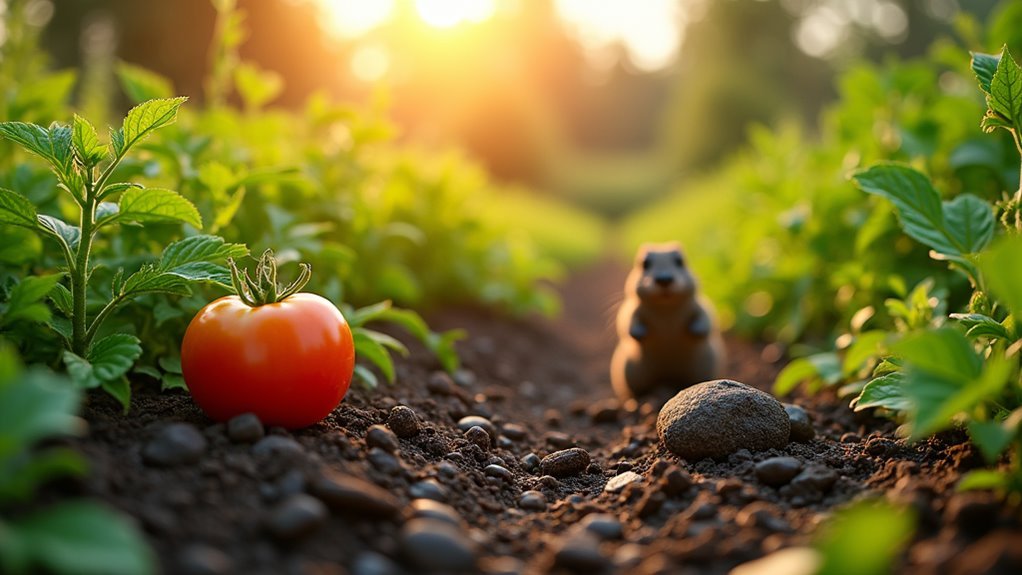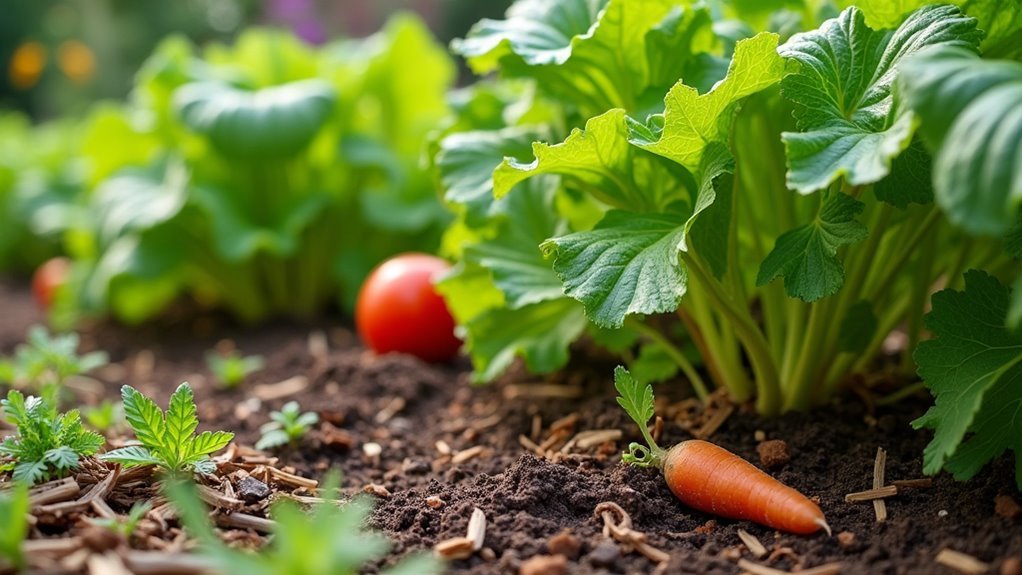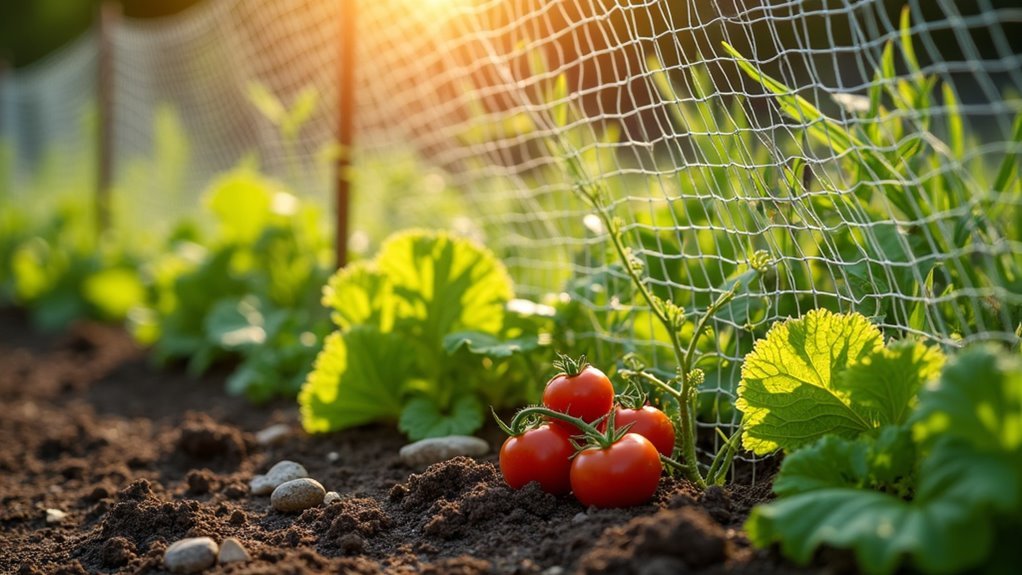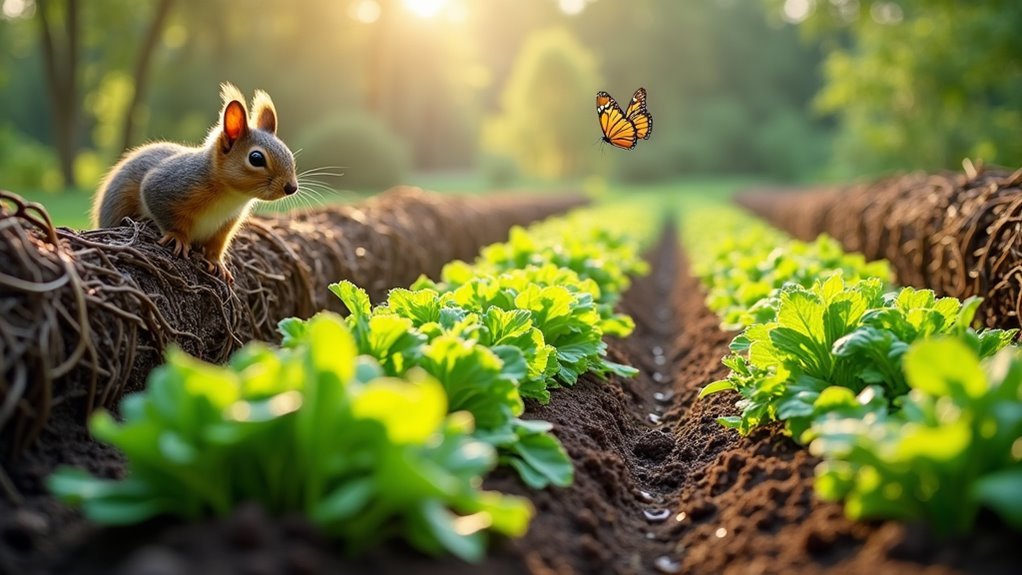You should create natural rodent barriers around vegetables because rodents cause significant crop loss by consuming plants, seeds, and roots primarily at night when damage isn’t easily detected. Mice, rats, voles, and squirrels target different parts of your garden, from ground-level seedlings to underground root systems. Natural barriers using hardware cloth, repellent plants like peppermint and lavender, and strategic garden design protect your harvest without introducing harmful chemicals near your food or affecting beneficial wildlife that maintains your garden’s ecosystem.
Understanding the Rodent Threat to Vegetable Gardens

While you’re sleeping soundly at night, rodents are likely feasting on your carefully tended vegetables and wreaking havoc throughout your garden.
These nocturnal pests, including mice and rats, rapidly consume diverse vegetables, causing significant crop loss and financial damage. You won’t notice their destruction until substantial harm occurs since they feed under darkness.
Beyond eating your produce, rodents create additional problems by burrowing beneath garden beds and pathways, undermining your garden’s structural integrity. They’ll also gnaw electrical wires and water pipes, creating safety hazards and expensive repairs.
Understanding this threat helps you recognize why effective barriers are essential. When you prevent rodent access to vegetable gardens through proper protective measures, you’ll maintain healthier, more productive growing spaces.
Benefits of Natural Barriers Over Chemical Solutions
You’ll protect your family pets from toxic chemical exposure while creating a safer play environment for children when you choose natural rodent barriers over harmful pesticides.
These eco-friendly solutions prevent chemical runoff that damages local water supplies and kills beneficial insects that your garden actually needs.
You’ll also save money over time since natural barriers like wire mesh and repellent plants provide lasting protection without requiring repeated expensive chemical treatments.
Family Pet Safety First
When you’re protecting your vegetable garden from rodents, your family pets’ safety should be your top priority. Chemical rodenticides pose serious poisoning risks to dogs and cats who might accidentally ingest these toxic substances.
Instead, you’ll create a barrier using natural methods that keep both rodents away and pets safe. Wire mesh and hardware cloth provide effective physical protection without dangerous chemicals.
Plant deterrents like peppermint and marigolds naturally repel rodents while remaining safe if your pets nibble on them. Raised garden beds covered with mesh allow your pets to roam freely without encountering harmful materials.
Unlike rodent poison that can contaminate pet food areas, natural barriers offer peace of mind. You’re protecting your vegetables while ensuring your beloved animals stay healthy and safe.
Environmental Impact Reduction
Beyond protecting your pets, natural barriers considerably reduce environmental harm compared to chemical solutions.
When you install wire mesh or raised beds, you’re eliminating chemical pesticides that contaminate water sources and threaten aquatic ecosystems. These sustainable practices protect beneficial insects and pollinators that chemical treatments often kill indiscriminately.
Natural barriers improve your soil’s health by encouraging organic gardening methods that boost microbial activity and reduce soil erosion. You’ll maintain ecological balance while allowing natural predators to control pest populations effectively.
Cost-Effective Long-Term Solutions
While chemical pest control creates an endless cycle of purchases and applications, natural barriers deliver exceptional value through one-time investments that protect your garden for years.
You’ll save substantially by installing hardware cloth or constructing raised beds instead of repeatedly buying expensive chemical repellents. These DIY rodent control solutions require minimal maintenance once established, eliminating ongoing product costs and frequent reapplications.
Natural barriers like wire mesh and plant-based deterrents prevent rodents effectively without the continuous monitoring chemical methods demand.
When you choose materials such as galvanized hardware cloth for raised beds, you’re investing in protection that lasts seasons with virtually no upkeep.
This approach transforms pest management from a recurring expense into a smart, one-time investment that pays dividends through reduced costs and sustained crop protection.
Common Garden Rodents That Target Vegetables
You’ll encounter several rodent species that consistently target your vegetable garden, with mice and rats being the most destructive culprits.
These pests don’t just nibble randomly – they follow specific damage patterns that can help you identify which species you’re dealing with.
Squirrels create their own unique destruction patterns, often focusing on newly planted seeds and ripening fruits rather than established plants.
Mice and Rat Species
Several destructive rodent species can wreak havoc on your vegetable garden, each presenting unique challenges that require specific barrier strategies. Understanding these garden rodents helps you choose the most effective natural barrier approach.
| Species | Primary Damage | Garden Areas Targeted |
|---|---|---|
| House Mouse | Seeds, young plants | Ground level crops |
| Norway Rat | Root systems, structures | Underground areas |
| Roof Rat | Fruits, vegetables | Raised garden beds |
| Voles | Roots, tubers | Root vegetable crops |
The house mouse reproduces rapidly and targets seeds. Norway rats burrow extensively, undermining garden structures. Roof rats climb effectively, threatening your raised garden installations. Voles focus on gnawing roots and tubers. Each mice and rat species requires tailored natural barrier solutions.
Squirrel Damage Patterns
Though squirrels may appear harmless, these agile rodents cause extensive damage through their systematic foraging patterns that can devastate your vegetable garden in mere days.
You’ll notice they target specific crops like tomatoes, peppers, and corn, often consuming tender fruits and young seedlings. Their destructive habits extend beyond eating—they’ll dig up freshly planted seeds and bulbs, disrupting root systems and soil structure.
Spring and fall present peak danger periods when squirrels actively establish nests and stockpile food. Their instinctive burying behavior creates additional chaos as they excavate around healthy plants.
You can combat this destruction by installing barriers around vulnerable areas. Wire mesh and strategic fencing prove effective for protecting crops while maintaining garden accessibility and preserving your harvest investment.
Signs of Rodent Damage in Your Vegetable Garden

Telltale signs of rodent activity can help you catch infestations before they devastate your vegetable garden.
Look for visible gnaw marks on your plants, fruits, and seeds where rodents have been actively feeding. You’ll notice burrows around two inches in diameter near your vegetable patches, causing soil disruption and potential crop loss.
Check for smear marks along garden paths that are typically two to four inches wide, indicating frequent movement patterns. Listen for characteristic gnawing sounds and notice unusual smells, especially at night when these pests are most active.
Watch for uneven lawn surfaces or shallow tunnels created by voles that damage root systems. Identifying this damage early helps you implement an effective natural barrier before rodents destroy your harvest.
Essential Materials for Building Natural Rodent Barriers
You’ll need the right materials to build effective natural barriers that keep rodents out of your vegetable garden.
Hardware cloth with 1/4-inch mesh serves as your primary defense, creating a durable barrier that blocks rodent access while maintaining proper drainage.
Natural repellent plants like mint and lavender complement these physical barriers by adding an aromatic deterrent that rodents instinctively avoid.
Hardware Cloth Selection
Hardware cloth stands as the backbone of any effective rodent barrier system for your vegetable garden. You’ll want to choose 19-gauge hardware cloth for maximum durability and gnaw resistance.
Select a mesh size of 1/4 inch or smaller to prevent rodents from squeezing through while maintaining proper air circulation and light penetration.
When installing around raised beds, bury the hardware cloth at least 6 inches deep to stop burrowing voles and gophers. You can easily cut and shape this versatile material to fit around individual plants or entire garden perimeters.
The flexibility makes it perfect for creating custom rodent barriers that conform to your garden’s unique layout. Remember to inspect your barriers regularly for gaps or damage that could compromise their effectiveness.
Natural Repellent Plants
Several aromatic plants serve as powerful natural deterrents that’ll keep rodents away from your vegetables without using harsh chemicals.
Using natural repellents like peppermint, lavender, and marigolds creates an effective defense system that works alongside natural predators to protect your crops.
Strategic placement of these plants will maximize their deterrent effect:
- Garden perimeter – Plant garlic and peppermint around borders to establish the first line of defense.
- Entry points – Position lavender and marigolds at pathways where rodents typically enter.
- Between vegetable rows – Intersperse repellent herbs throughout your garden to create a natural barrier.
You can enhance protection by combining multiple repellent plants and using essential oil sprays from peppermint around vulnerable areas.
This approach will repel rodents while promoting garden biodiversity.
Physical Barrier Techniques Using Hardware Cloth and Wire Mesh

When rodents consistently breach other deterrent methods, physical barriers using hardware cloth and wire mesh provide one of the most reliable defenses for your vegetable garden.
You’ll need 1/4-inch mesh hardware cloth to effectively prevent rodents from burrowing while maintaining proper air and water circulation for healthy plants.
Install wire mesh by burying it at least 6 inches deep and extending 12 inches above ground. This creates a formidable barrier against accessing your crops.
For raised garden beds, line the bottom with mesh to protect roots while elevating plants beyond easy reach.
Inspect your barriers regularly for wear or breaches that could compromise protection.
Combine these physical barriers with natural repellents to maximize rodent control effectiveness throughout your growing season.
Creating Raised Bed Barriers for Maximum Protection
Although hardware cloth provides excellent ground-level protection, raised bed barriers offer superior defense by combining elevation with extensive coverage.
You’ll create an effective multi-layered pest control system that makes it considerably harder for rodents to access your vegetables.
To build raised beds with wire mesh for maximum protection:
- Install hardware cloth at the bottom before adding soil to prevent burrowing rodents from accessing garden beds to prevent underground intrusions.
- Construct beds 12-18 inches high to discourage jumping and climbing attempts by mice and voles.
- Add perimeter fencing around beds using chicken wire to create additional barriers that keep rodents away from your plants.
Regular inspection of these barriers guarantees gaps don’t develop, maintaining your garden’s defense system against persistent rodent threats.
Plant-Based Deterrents and Companion Planting Strategies
While physical barriers provide solid protection, you can strengthen your garden’s defense system by incorporating plants that naturally repel rodents through their powerful scents and properties.
Plant mint, lavender, and garlic around your vegetable beds to create an effective rodent repellent barrier. These aromatic herbs work because their strong fragrances overwhelm rodents’ sensitive noses.
Companion planting maximizes your garden’s potential by strategically positioning repellent plants alongside vulnerable vegetables.
Marigolds serve dual purposes—they deter rodents while attracting beneficial insects that maintain garden balance. Position these repellent plants around your bed perimeters as your first defense line.
Remember to refresh your plantings regularly, as plant roots and foliage lose potency over time.
This maintenance guarantees your natural deterrent system remains effective throughout the growing season.
Maintaining and Monitoring Your Natural Barrier System
Since your natural barrier system requires ongoing attention to remain effective, establish a regular inspection routine that becomes second nature.
You’ll need to maintain your barriers through consistent monitoring to prevent rodents from finding weak spots or adapting to your defenses.
Schedule monthly checks during growing seasons to:
Monthly inspections during growing season ensure your natural rodent barriers remain intact and effective against evolving pest challenges.
- Inspect physical barriers – Look for tears in mesh, gaps in fencing, or damage that rodents could exploit.
- Monitor surrounding areas – Check for new burrows, droppings, or signs of increased rodent activity near your vegetable garden.
- Document effectiveness – Record changes in pest activity after installing or adjusting barriers to guide future modifications.
Maintain healthy vegetation around your barrier perimeter, as robust plantings enhance deterrent effects while providing natural camouflage.
Regular maintenance guarantees your investment continues protecting your harvest effectively.
Combining Multiple Natural Defense Methods
When you layer multiple natural defense methods, you create a thorough protection system that’s far more effective than relying on any single approach.
Start by establishing raised beds with wire mesh as your foundation barrier, then enhance this physical protection with aromatic herbs like mint and lavender planted around the perimeter.
You’ll want to keep predator scents active by placing fox urine granules and owl decoys strategically throughout your garden area.
Motion-activated sprinklers add an unpredictable element that startles rodents.
Natural repellents like peppermint oil on cotton balls require regular renewal to maintain potency.
This multi-layered approach creates an environment where rodents face constant deterrents, making your vegetable garden an unappealing target.
Long-Term Garden Management for Rodent Prevention
Although initial setup of natural barriers provides immediate protection, maintaining their effectiveness requires consistent long-term management strategies that address both preventive measures and ongoing maintenance.
Successfully keeping rodents away from your vegetables demands a thorough approach that evolves with seasonal changes and garden growth.
Your long-term rodent prevention strategy should focus on these essential elements:
- Regular barrier inspections – Check wire mesh and raised beds with wire mesh monthly for damage, wear, or gaps that compromise protection.
- Habitat management – Remove debris, fallen fruits, and overgrown vegetation to eliminate potential food sources and nesting areas.
- Strategic plantings – Maintain rodent-repelling herbs like mint and lavender around garden perimeters as natural deterrents.
This systematic approach guarantees your natural defenses remain effective year-round.
Frequently Asked Questions
How Do I Protect My Vegetable Garden From Rodents?
Install wire mesh or hardware cloth around your garden beds, burying barriers six inches deep. Use raised beds for added protection. Regularly inspect barriers and plant rodent-repelling herbs like mint nearby.
How Do Rodents Affect Crops?
Rodents devastate your crops by eating seeds, seedlings, and mature plants. They’ll consume one-third their body weight daily, undermine root systems through burrowing, and contaminate produce with droppings.
Why Are Rodents Important to the Ecosystem?
You’ll find rodents serve essential ecosystem functions: they disperse seeds, feed predators, aerate soil through burrowing, cycle nutrients via waste, and control insect populations, maintaining natural balance.
How Do Rodents Contaminate Food?
Rodents contaminate your food by urinating and defecating on produce, gnawing with saliva-covered teeth, and carrying disease-transmitting parasites like fleas. You’ll face spoilage, bacterial contamination, and serious health risks from pathogens.
In Summary
You’ve learned that natural rodent barriers protect your vegetables without harming the environment or your family’s health. By combining physical barriers, companion planting, and natural deterrents, you’ll create an effective defense system that evolves with your garden’s needs. Don’t rely on just one method—layering multiple natural strategies gives you the best protection. With consistent monitoring and maintenance, you’ll enjoy healthier vegetables while keeping unwanted visitors at bay naturally.





Leave a Reply